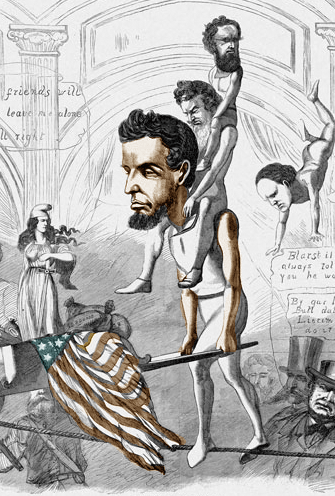LINCOLN STUDY FORUM
Born Equal: Remaking America's Constitution, 1840-1920
By Akhil Reed Amar
Yale law professor Akhil Reed Amar has been described as one of America's most prodigious constitutional scholars. He has now written the definitive history of how the ideal of birth equality reshaped the American Constitution, from antebellum debates over slavery and secession, to the Civil War and emancipation, to women’s suffrage.
In Born Equal, Amar recounts the dramatic constitutional debates that unfolded across eight decades, when four glorious amendments abolished slavery, secured Black and female citizenship, and extended suffrage regardless of race or gender. At the heart of this era was the epic and ever-evolving idea that all Americans are created equal. The promise of birth equality sat at the base of the 1776 Declaration of Independence. But in the nineteenth century, remarkable American women and men—especially Elizabeth Cady Stanton, Frederick Douglass, Harriet Beecher Stowe, and Abraham Lincoln—elaborated a new vision of what this ideal demanded. Their debates played out from Seneca Falls to the halls of Congress, from Bleeding Kansas to Gettysburg, from Ford’s Theater to the White House gates, ultimately transforming the nation and the world.
An ambitious narrative history and a penetrating work of legal and political analysis, Born Equal is a vital new portrait of America’s winding road toward equality.
We recently read what some consider a companion piece to Amar's work. The Rise and Fall of the Second American Republic: Reconstruction 1860-1920 by Manisha Sinha covers the social history of this period.
The facilitator for this discussion is Lincoln scholar, author, and educator Tom Peet. Tom will guide our discussion over four monthly sessions beginning on February 14, 2026.
New participants are welcome. See note below for how to join.


Join the Study Forum
All members of the Lincoln Group are welcome to participate in this study and discussion group. The Study Forum meets once a month on a Saturday from 10 a.m. until noon, eastern time. Most often, we learn from a recently published book about Lincoln or his era. Members submit questions to a facilitator who organizes the meeting format for maximum engagement.
You are welcome to join at any time regardless of your personal knowledge level. We are all learning together to better appreciate the leadership and legacy of Abraham Lincoln. We ask that you do the reading and participate in the conversation. While we have met in person at the Ford's Theatre Learning Center, we are currently Zoomers, meeting from the comfort of our homes.
Sign up or ask questions using the contact comment box at the bottom of this page. You are also welcome to try us out if you are considering membership.
Current Discussion: Born Equal: Remaking America's Constitution, 1840-1920
By Akhil Reed Amar









